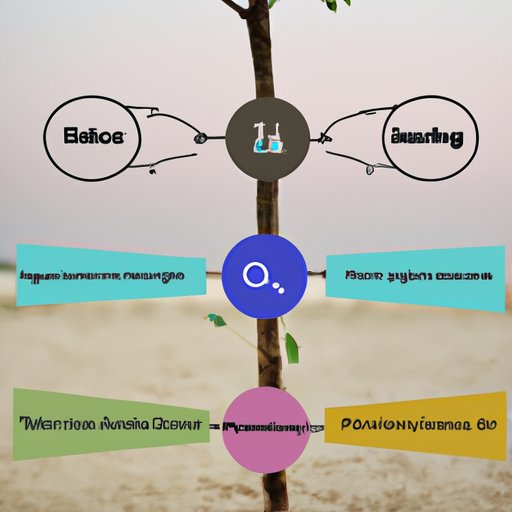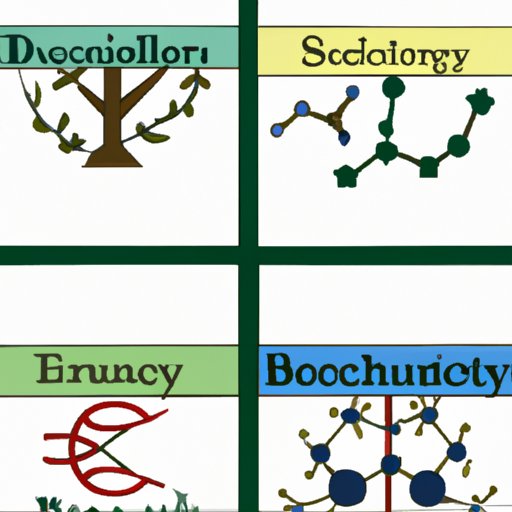Introduction
Science is an ever-evolving field of study that has been a source of knowledge and advancement for centuries. While there are many subcategories within science, the four main branches are biology, chemistry, physics, and earth sciences. These four branches cover a wide range of topics, from the study of living organisms to the exploration of our planet’s geology.
Understanding the four branches of science is essential to problem-solving and advancing our knowledge of the world around us. Each branch offers unique insights and perspectives on the natural world and can be used to explore a variety of scientific concepts. In this article, we will explore the four branches of science in greater detail and examine the interconnectedness between them.

A Comprehensive Overview of the Four Branches of Science
Biology is the study of living organisms and their relationship to their environment. This branch of science covers all aspects of living things, including anatomy, physiology, genetics, evolution, and ecology. It is a diverse field of study that encompasses a variety of topics, such as plant and animal behavior, cellular structure, and biochemistry.
Chemistry is the study of matter and its properties. This branch of science focuses on the composition, structure, and behavior of atoms and molecules. It is a highly complex field of study that covers a wide range of topics, such as chemical reactions, thermodynamics, and quantum mechanics.
Physics is the study of the universe and its laws. This branch of science deals with the forces of nature, such as gravity, electricity, and magnetism. It also explores the behavior of matter on a microscopic scale, such as atomic structure, particle physics, and quantum mechanics.
Earth sciences is the study of the planet and its processes. This branch of science covers a wide range of topics, such as geology, atmospheric science, oceanography, and meteorology. It explores the physical and chemical characteristics of the Earth and examines how they interact with each other.
The Importance of Understanding the Four Branches of Science
Knowledge of the four branches of science is essential to understanding the world around us. From the tiniest atom to the largest galaxy, each branch of science provides insight into the natural world and helps us gain a better understanding of the universe. This knowledge can be used to solve complex problems and advance our understanding of the world.
In addition, understanding the four branches of science has a significant impact on our everyday lives. By gaining an understanding of the natural world, we can make informed decisions about our health, safety, and environment. We can also use this knowledge to develop new technologies, medicines, and materials that can help improve our lives.
Exploring the Interconnectedness of the Four Branches of Science
The four branches of science are interconnected in many ways. For example, a biologist may use the principles of chemistry to analyze the genetic structure of an organism, while a chemist may use the principles of physics to measure the energy released during a reaction. In addition, an earth scientist may use the principles of biology to study the effects of climate change on different ecosystems.
In addition, specializing in one branch of science can provide valuable insights into other areas. For example, a physicist may gain a better understanding of the behavior of particles by studying chemistry, while a chemist may gain a better understanding of the structure of atoms by studying physics. This interconnectedness allows scientists to gain a more comprehensive view of the natural world and apply their knowledge to a variety of areas.

How to Use the Four Branches of Science in Everyday Life
By understanding the four branches of science, we can use this knowledge to make informed decisions in our everyday lives. For example, a person may use their knowledge of biology to make healthier lifestyle choices, or a person may use their knowledge of chemistry to understand the ingredients in the food they eat. In addition, knowledge of the four branches of science can be used to solve complex problems and develop new technologies.
In addition, using the four branches of science in everyday life can help us gain a better understanding of the world around us. By exploring the interconnectedness between the four branches, we can gain a deeper appreciation for the complexity of the natural world and the importance of science in our lives.
What Can We Learn from Studying the Four Branches of Science?
Studying the four branches of science can provide valuable insights into the natural world. By exploring the interconnectedness between the four branches, we can gain a better understanding of the universe and its laws. In addition, studying the four branches of science can help us develop new technologies, medicines, and materials that can benefit society.
In addition, studying the four branches of science can help us gain a better appreciation for the complexity of the natural world. As Albert Einstein famously said, “Look deep into nature, and then you will understand everything better.” By studying the four branches of science, we can gain a deeper understanding of the world around us and the importance of science in our lives.

Examining the Benefits of Specializing in One of the Four Branches of Science
Specializing in one branch of science can provide many benefits. By focusing on a specific area, a person can gain a deep understanding of the subject and develop a comprehensive knowledge base. This specialized knowledge can then be applied to other areas of science, allowing the person to gain a more comprehensive view of the natural world.
For example, a person who specializes in chemistry may gain a better understanding of the behavior of atoms, which can then be applied to other areas, such as biology or physics. Similarly, a person who specializes in earth sciences may gain a better understanding of the planet’s geology, which can then be applied to other areas, such as oceanography or atmospheric science.
Conclusion
The four branches of science – biology, chemistry, physics, and earth sciences – are interconnected in many ways. By understanding the four branches of science, we can gain a better understanding of the natural world and use this knowledge to solve complex problems and develop new technologies. In addition, specializing in one branch of science can provide valuable insights into other areas and allow us to gain a more comprehensive view of the universe.
By studying the four branches of science, we can gain a deeper appreciation for the complexity of the natural world and the importance of science in our lives. Understanding the interconnectedness between the four branches is essential to advancing our knowledge of the universe and making informed decisions in our everyday lives.
(Note: Is this article not meeting your expectations? Do you have knowledge or insights to share? Unlock new opportunities and expand your reach by joining our authors team. Click Registration to join us and share your expertise with our readers.)
